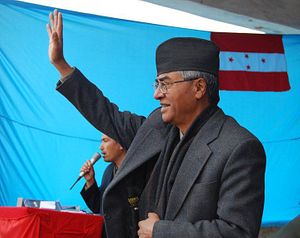Sher Bahadur Deuba, a veteran politician, was appointed Nepal’s prime minister for the fifth time on Tuesday, a day after the Supreme Court reinstated the House of Representatives and upheld his claim to be the new leader.
President Bidhya Devi Bhandari’s office said Deuba, who leads the Nepali Congress party, was appointed the new prime minister.
Deuba will lead the Himalayan nation as it struggles with political divisions and the coronavirus.
The court on Monday ordered that Khadga Prasad Oli, who had been running a caretaker government until planned elections, be replaced by Deuba.
It also ordered the reinstatement of the House of Representatives, which was dissolved by Oli in May, and said the lawmakers must meet within seven days. Deuba will have to prove in a vote that he has the support of more than half the House members to continue in office. Deuba’s Nepali Congress only holds 63 seats out of the House of Representatives’ 275 total, but it has put together an alliance with disgruntled members of Oli’s erstwhile ruling coalition – notably, the Maoist faction of the Communist Party of Nepal – to reach majority control.
Deuba was previously appointed prime minister in 1995, 2001, 2004, and 2017, but has never served a full term. This time as well, he is to serve only until parliamentary elections are held by 2022.
He is likely to bring Nepal back closer to India after Oli favored ties with its other giant neighbor, China.
Deuba has been active in politics since he was a college student. He was jailed for nine years for protesting against the now-deposed monarchy’s autocratic rule. He has led Nepali Congress, the country’s oldest political party, for years.
In a televised speech, Oli criticized the Supreme Court decision but said he would leave office.
In May, Oli directed the president to dissolve the House of Representatives, Parliament’s lower house, and announce new elections later this year. The decision was challenged in the Supreme Court by a coalition of opposition parties that said they had the support of a majority in Parliament to form a new government.
Oli earlier had the House of Representatives dissolved in December and called for new elections in April, but that also was rejected by the Supreme Court, and the House was reinstated in February.
Oli became prime minister in 2018 after his Communist Party of Nepal won a majority of the seats in the House of Representatives. However, he refused to honor an agreement to hand over power to the party’s co-leader after half his term, leading to political splits and weakening Oli’s hold on power. Oli has also been criticized for his handling of the coronavirus pandemic.

































